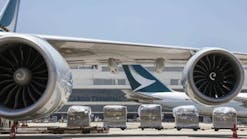Travelers have more choice than ever before. For any given destination there is usually a handful of operators a customer can choose from, thanks to the rise of low-cost and ultra low-cost carriers. After spawning in the US in the 1970s and really taking off in Europe in the mid-90s, low-cost carriers are now a truly global phenomenon. In response to this trend, legacy airlines are increasingly providing consumers with even more choice in the form of low-cost or basic economy ticket options, stripping back some of the perks of the flight experience, and frequent flyer benefits, to offer a competitive ticket price. In the US today, American, Delta and United all offer basic economy fares across their domestic network, with 2018 having seen accelerated rollout of these fare options to many international routes.
With increased competition and choice between airline experiences, what are the implications for loyalty? In an era of dollars spent, not miles flown currency accrual, lower fares will undoubtedly have an impact on flyer loyalty – the question is, how should airlines react?
Understanding who is on-board with low-cost flying
The biggest risk is to assume that those flying on low-cost carriers or choosing basic economy fares will do so every time they fly. It’s a common misconception that these services are primarily used by millennials, low-value customers, or those who will never be swayed by anything other than price.
The reality is, there is much more to a customer’s perception of value than price. There are many reasons why someone might fly with a low-cost carrier or choose a basic economy fare. For example, they might be heading to a short-haul destination, so they feel that they can forego the additional comfort provided by a traditional carrier, or give up some of the usual benefits associated with a regular economy fare given shorter flight times.
To really nail loyalty and build ongoing relationships with their customers, airlines cannot make assumptions that every trip purpose is the same. They need to collect and mine data on their customers to build a true picture at an individual level, and understand why their customers fly, each time they fly. For example, ancillary purchases, such as lounge access or extra legroom, may be a great indicator of somebody who is typically used to a more comfortable travel experience. Mining these insights will help airlines to see the bigger picture and understand which customers present the best opportunities to create more valuable, ongoing relationships.
A false-economy for corporate travel policies
One of the biggest categories of flyers using basic economy is those travelling on business. This is because many companies have a price cap, or even lowest available fare policy, however, this approach to business travel is not without its risks. For example, if a meeting overruns and an employee misses their flight, there is rarely an opportunity to switch to an alternative flight with a highly restrictive basic economy fare, potentially leaving them stranded, or at the very least, annoyed.
In reality, this is a short-term versus long-term debate. By only shopping at the lowest price points, what will the longer-term impact be in terms of status, points, benefits, rewards and discounts lost? Short-term cost savings could easily be dwarfed by the “real” value and benefits potentially earned through flying on more premium (but more expensive) fares.
In addition, and admittedly not always as easy to quantify, is the cost of a key employee becoming frustrated and stressed during an important business trip – simply because they couldn’t be as productive with their cheaper, basic economy booking. Yes, the company may have saved $100 on a basic economy fare, but that saving could be dwarfed by the productivity loss when the employee misses out on key benefits such priority boarding, advance seat selection and potential complimentary upgrades to first class normally associated with their frequent flyer status.
How should airlines adapt their loyalty strategy?
Most airlines offering basic economy options still allow frequent fliers to accrue loyalty points or award miles on these fares – this is an important element of building loyalty in the basic economy age. However, transparency around the accrual and use of points or loyalty currency is vital. Hiding any restrictions or rules around loyalty points and redemption in the fine print only frustrates members and can have a negative impact on engagement and loyalty.
Allowing basic economy customers to accrue points or miles in a frequent flyer program helps make them feel valued and important. It provides vital data and insights which can be used to create opportunities to increase customer engagement, and over time the amount they spend. The key is providing highly targeted and personal communications based on, logical and attainable upgrades and ancillary opportunities. For example, an offer for a slightly discounted first-class fare to a customer that usually flies basic economy is in reality, pretty unlikely to convert. However, if that same customer is somebody who flies regularly to the same destination, the airline in question could maybe entice them to invest in economy plus, with a value story about ‘improving the travel experience to a favored destination’ – maybe bundling in a discounted hotel, or car rental too.
Final thoughts
Loyalty is both emotional and transactional. In an age with so many carriers and fare options, airlines need to be able deliver personalized relationships. While basic economy is rising in popularity with consumers, airlines need to be careful not to race all the way to the bottom. They need to take a longer-term view with basic economy fares. Cutting corners in the short term may end up alienating an existing, loyal customer base and costing an airline more in the long term. But the opportunity is there for those airlines that get basic economy right. The key is to develop a deep understanding through data analytics of why customers fly, each time they fly, and enable them to still feel recognized as an individual through relevant personalized communications and attainable, logical deals, regardless of what ticket they purchase.
Based in the Bay Area, Phil Seward is senior vice president for the Americas at Collinson and is regional director for the Americas at the group's ICLP. The companies provide customer-loyalty services across multiple sectors, including retail, travel and technology. Clients include DHL, Harrods and Cathay Pacific Airways.



